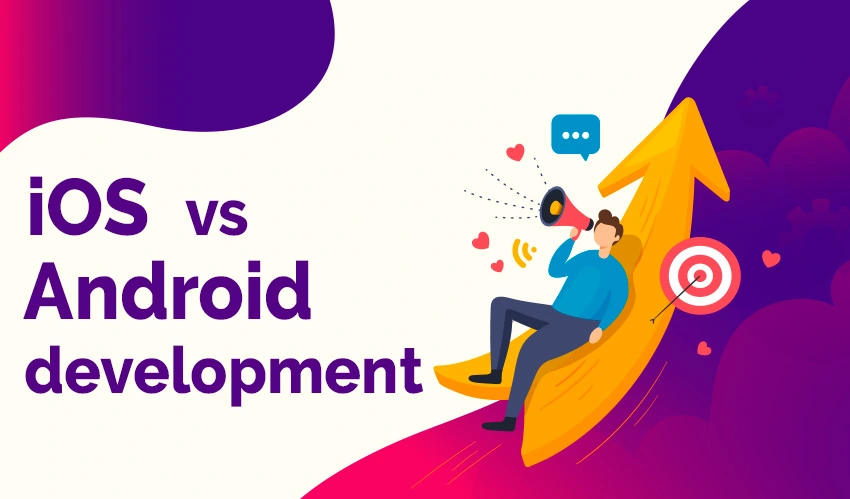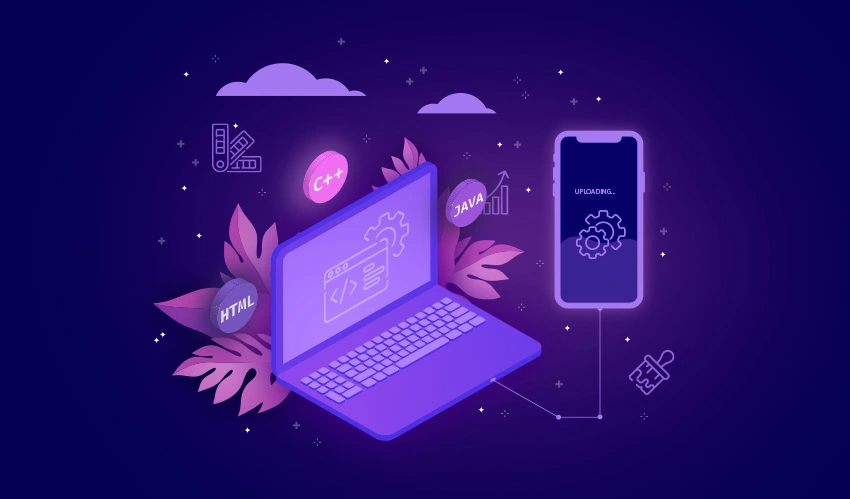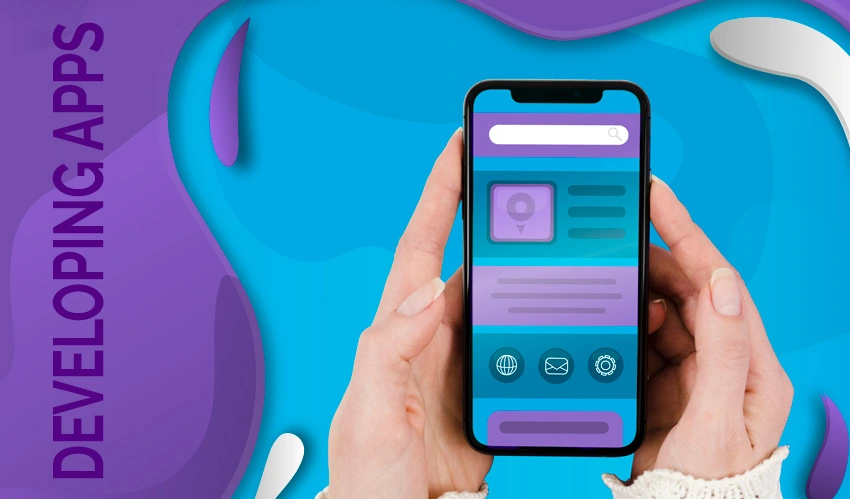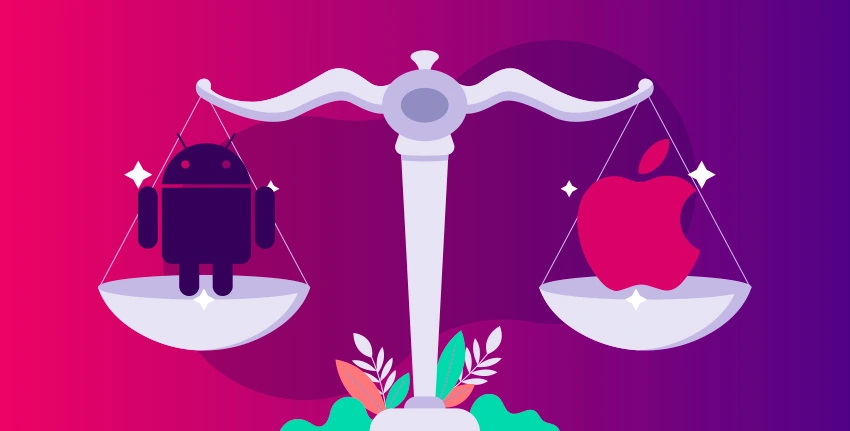Android vs iOS Development – What’s the Difference
Running a new application these days is the best idea. There were 5.1 billion mobile owners worldwide in 2019, and this figure is expected to increase to 7.3 billion by 2023.
This data is undeniable, and developers are trying to meet this demand.
However, choosing the platform for which the product is intended can seem daunting. Over the past few years, we have seen a confrontation between iOS development vs Android development. The Apple corporation holds about 30% of the total audience, while Android attracts almost 70% of all smartphone/tablet owners. The exception is the United States, where both operating systems have approximately equal market shares.
Running an Android or iOS product, you improve your business by attracting a huge audience of users. But what’s the difference between them? We are here to answer this question by providing up-to-date information on the mobile market.

DIFFERENCE BETWEEN IOS VS ANDROID DEVELOPMENT
Both OS are popular and powerful, but choosing the best one can be a little tricky. In addition, each of them is intended for different solutions, and before choosing, you need to determine your target audience, client demographics, application complexity, cost, and so on.
These are the main issues requiring special attention while developing apps for Android vs iOS. However, there are slightly more differences that somehow relate to the development process for a particular group of gadgets. We’ve tried to make it easy for you by explaining the main differences between the platforms.
Programming Languages
The use of different languages of coding will be the first difference in Android vs iOS app development. Apps for Android are primarily based on Java, which requires a lot of code. The Kotlin alternative appeared not so long ago. It is an intuitive and easy-to-read Java-compatible language. Thanks to these features, it has become a more popular solution for Android products.
Meanwhile, iOS apps are being developed based on Swift, which was developed specifically for this operating system. Swift appeared in 2014, and it has become more popular than Java because now, specialists can write less code, which allows them to launch applications much faster.
Tools for Development
Nowadays, the market is filled with various technologies and new tools for app development Android vs iOS of varying complexity. Most of the developers who work with Android use an open development platform. It became popular because it supports third-party applications and tools. That allows them to test all the options/features by integrating them into their products.
Apple has such a platform either. However, it has a limited set of tools, and you cannot use third-party solutions for your projects. This fact does not give access to experiments with new technologies. Accordingly, iOS has less freedom than Android.
Development Time and Cost
Developing for iOS vs Android, many of you are wondering about the cost of the project and the time spent. Please note that the price of Android products is almost always higher. That is because the operating system supports plenty of devices, which have different screen sizes. This not only increases the development period but also the price.
Meanwhile, iOS is available on fewer devices, which speeds up the process of development. Remember that the final price for iOS vs Android app development depends on several factors, including features and complexity.
For example, the development of a calculator will take about a week and the cost of such a project does not exceed $1000. If you are interested in building a new social network with development complexity (databases and API integrations), be ready to spend at least $50.000 over the next 5-6 months.
When checking for differences in app prices, look at the cost of publishing a product in the App Store and Google Play Store. By hosting an Android application, you need to pay a one-time fee of 25 USD. iOS’s clients pay 99 USD annually.

ANDROID DEVELOPMENT
As a reminder, Google released Android back in 2007. In recent years, this operating system has outstripped all its competitors and has become the leading platform. Its source code is called the Android Open Source Project, and you will often come across its acronym (AOSP).
Programmers most often use Kotlin, Java, or C++. Sometimes they take additional Google tools, the list of which includes Firebase and Android Jetpack.
Pros Developing Apps for iOS and Android
When comparing Android vs iOS development, we need to look at their pros and cons. In this section, we will look at the advantages of the first type of OS:
- Open system. Thanks to the unique structure of the platform, developers have access to third-party applications and tools that provide more functions and solutions.
- Design tips. Google always knows what users like, so it makes design recommendations to developers, which leads to an intuitive user interface.
- Fragmentation. This point can also be considered a disadvantage, but fragmentation allows you to develop products for a wide range of devices, including smartphones, tablets, and televisions.
- Release. Unlike iOS, Android apps are easy to add to the Google Play Store in just a few hours. Users will find and download your product faster, and you’ll get great results.
However, we also need to consider the possible disadvantages.

Cons Developing for Android vs iOS
- Fragmentation. As already mentioned, this item can be both positive and negative. You will need to pay due attention to all types of devices and screens if you want your application to work properly after every update.
- Testing. Due to the large number of devices and their features, developers need more time to test the application. Surely, you cannot skip this step, which can lead to various bugs.
- Cost. The introduction of the two previous options leads to an increase in the cost of the project, in contrast to iOS, which is available on a limited number of devices.
What are Apple’s strengths and weaknesses?
DEVELOPING IOS APPS
iOS’s specialists create products for different versions of iPhone and iPad. Despite the great popularity of Android, Apple’s annual revenues are not inferior to positions because its gadgets are sold in developed countries where people are able to pay for apps. However, this operating system has a closed source code that works on Apple devices only. So, it’s time to compare the pros and cons of iOS vs Android development.
Pros Developing iOS Apps vs Android Apps
- Profit. There is an opinion that Apple sells gadgets to wealthier customers, and this is true. They are willing to spend more money buying a particular app if it has value. Most of the iOS fans are based in Western countries where people earn more and trust the App Store.
- Fragmentation. Most gadgets run on the same version of the operating system developed for iPads and iPhones. Developers don’t have to think about dozens of devices with different screen sizes and other parameters.
- Standardized user interface. Thanks to very detailed UI instructions, developers don’t have to think about it, which saves a lot of time. Therefore, they spend more resources and energy on the application itself.
These are the main benefits that attract business owners and many developers.
Cons of Developing iOS Apps vs Android Apps
- Product release on the App Store. Please note the strict requirements for publishing your app in this store. At its sole discretion, the App Store may reject your new app due to one or more parameters: security problems, poor performance, or anything else.
- Testing. Due to the high requirements for product quality, your developer must conduct deep testing, which requires a lot of time and additional funds.
- Customization. In order to attract a part of the audience, your application must be unique and attractive. But due to standardization guidelines, some products lose initial creativity and become “like the rest”. That can alienate many customers.
To be successful, you only need to pay attention to possible disadvantages and eliminate them.
ANDROID DEVELOPMENT VS IOS DEVELOPMENT: VERDICT
The mobile market holds great promise, so leading companies are producing more smartphones and tablets, while developers are creating more and more applications. If you want to release a new app, you need to compare both platforms.

You need to target iOS if:
- You are interested in higher revenue per user.
- You don’t want to have a complicated development process.
- Your priorities are customer safety and privacy.
Android is the best solution if:
- You’re going to reach a wider audience of users.
- You’re going to create a fast download and install the application.
- You’re going to customize the app for different devices.
The last thing you need is to find a company for iOS app development vs Android that will take into account your requirements and provide a quality product!
FAQ
Why should I develop a new app?
With the help of a mobile app, customers will actively use your products/services. Thanks to additional options, you can use push notifications, discounts, and other solutions to increase the number of sales.
What is the difference between Android vs iOS development?
We’ve found many differences from price to audience and number of users.
What language is intended for developing Android apps?
When it comes to Android, Java, and Kotlin are the most popular. Although, the second one has become more popular in recent years as it is better for beginners.
What language is used when creating iOS solutions?
This category of apps is developed based on Swift, which was created exclusively for the Apple brand.
